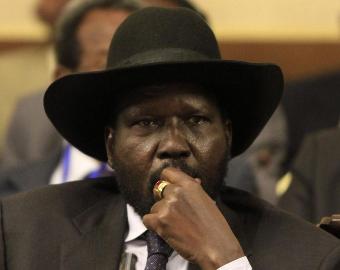South Sudan accuses foreign powers of blocking peace deal
July 23, 2015 (JUBA) – A senior member of South Sudan’s governing Sudan People’s Liberation Movement (SPLM) has accused unnamed foreign powers of allegedly playing a negative role in blocking attempts to resolve the more than 19 months long civil war with the armed fighters allied to the former vice president, Riek Machar.

In the latest expression of similar frustrations, a powerful and influential senior official of the ruling SPLM, Daniel Awet Akot, who is one of the political allies and confidants of president Kiir, on Thursday accused countries he did name in the region of allegedly delaying the peace talks and priotizing their own conflicting interests over South Sudan.
Akot alleged that the two warring parties led by president Kiir and opposition leader Machar were taking long time, failing to sign a peace agreement and end the conflict because foreign powers had not given the South Sudanese leaders the opportunity to sit down as a family to resolve their own differences without external interference on how internal political differences could be resolved “between brothers.”
“There are always zones of possible agreement and also best alternatives to negotiated agreement but these opportunities have been overshadowed and avoided with unnecessary issues,” said Akot.
“SPLM has always managed to overcome difficulties using its internal strength and ways to identifying areas where there is a need for improvement and adjustment. We did that in 1987 with Anyanya II and again in 2002 with Riek and in 2003 with Lam Akol. We did not have foreign mediators,” he said.
Akot, who seemed to be against any mediation in the conflict by external body said foreign involvement in the peace process was causing obstacles in reaching a final peace agreement, asserting that the two sides had never been given ample time to come out with their own agenda and proposals.
General Bona Bhang Dhol, a senior military figure turned legislator from president Kiir’s Awan Chan village, also told Sudan Tribune in a separate interview that the behaviours of some of the neighbouring countries were allegedly becoming the source of the inability of the Intergovernmental Authority on Development (IGAD) to resolving the conflict because “their interest had overshadowed their role.”
He also accused a number of IGAD member states of allegedly supporting the rebel leader, Riek Machar, in the internal conflict, but shied away from naming these countries.
“The actions and the behaviours of some IGAD member countries in supporting the rebels of Riek Machar are not just adding tension to the region but the reasons for which peace talks have not been able to make progress,” Dhol said.
“There are countries which have demonstrated that they do not respect the sovereignty of their neighbours and they are willing to use force to achieve their goals. This is what they are in this country except Uganda and few other countries,” he said.
The legislator further alleged that the military actions and political behaviours of “these” unnamed countries were undermining regional security directly and through proxy forces.
“They think no one knows about their involvement in the conflict but their actions are no longer concealable. If you can provide logistics, provide training centres and provide a base, then you are no longer playing a neutral role in the conflict. Actually you are an open participant,” he added.
South Sudan government has been accusing the neighbouring Sudan to the north of allegedly supporting the opposition forces led by former vice president, Riek Machar. Khartoum denied the accusations as baseless and counter-accused Juba of allegedly harbouring, supporting, training and arming Sudanese rebel factions against the government of president Omer Hassan al-Bashir.
In the past, Juba also accused neighbouring Ethiopia to the east of providing sanctuary to the officials of the rebel movement including providing them with access to medical care in Gambella region. Ethiopia dismissed military support to the rebels, saying it was only acting on humanitarian grounds.
This week Juba’s foreign ministry also accused Kenya of providing freedom to Machar on its soil in which he launched a call against president Kiir to step down in a widely covered press conference in Nairobi on 8 July. Kenya reacted by dismissing the complaint, saying they were exercising their policy of neutrality in the conflict and that the country could deal with both Kiir and Machar as mediator.
However, South Sudan welcomes on its side the direct military involvement of the neighbouring Uganda to the south and further signed a military cooperation agreement to help it fight its opposition forces. Ugandan troops since January last year when the war erupted have continued to protect Juba, the national capital, and Bor, capital of Jonglei state, 200km from Juba.
Rebels have been calling for the withdrawal of the Ugandan troops from South Sudan, saying they should not involve in the internal conflict and were allegedly responsible for the government’s disrespect to the cessation of hostilities agreement both sides signed on 23 January 2014.
Previous attempts of direct negotiations between president Kiir and rebel leader, Machar, failed to bear fruits when their face-to-face talks collapsed on 6 March this year.
Another round of negotiations organized by IGAD-Plus is scheduled to take place in mid-August between the rival parties where the two principal leaders will have an opportunity for face-to-face talks to resolve outstanding issues and sign a final peace agreement.
(ST)
